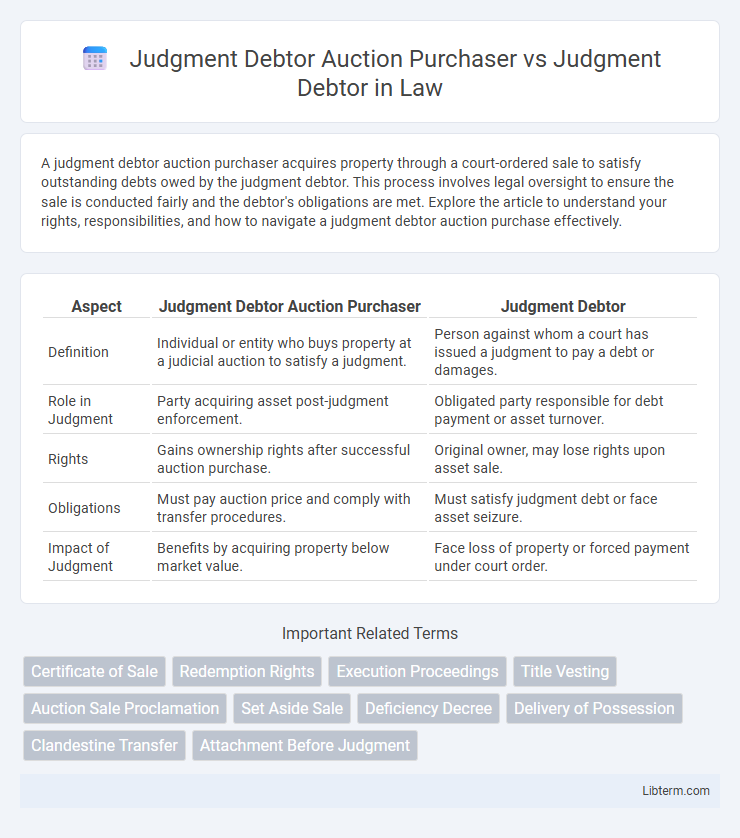A judgment debtor auction purchaser acquires property through a court-ordered sale to satisfy outstanding debts owed by the judgment debtor. This process involves legal oversight to ensure the sale is conducted fairly and the debtor's obligations are met. Explore the article to understand your rights, responsibilities, and how to navigate a judgment debtor auction purchase effectively.
Table of Comparison
| Aspect | Judgment Debtor Auction Purchaser | Judgment Debtor |
|---|---|---|
| Definition | Individual or entity who buys property at a judicial auction to satisfy a judgment. | Person against whom a court has issued a judgment to pay a debt or damages. |
| Role in Judgment | Party acquiring asset post-judgment enforcement. | Obligated party responsible for debt payment or asset turnover. |
| Rights | Gains ownership rights after successful auction purchase. | Original owner, may lose rights upon asset sale. |
| Obligations | Must pay auction price and comply with transfer procedures. | Must satisfy judgment debt or face asset seizure. |
| Impact of Judgment | Benefits by acquiring property below market value. | Face loss of property or forced payment under court order. |
Overview of Judgment Debtor and Auction Purchaser
A judgment debtor is an individual or entity against whom a court has issued a monetary judgment, requiring payment of a specified debt. An auction purchaser is a third party who acquires property or assets of the judgment debtor through a judicial or foreclosure auction to satisfy the judgment debt. The interaction between the judgment debtor and auction purchaser revolves around the enforcement of the court's decision and the transfer of ownership rights arising from the auction sale.
Legal Definition of Judgment Debtor
A judgment debtor is an individual or entity against whom a court has issued a monetary judgment requiring payment of a debt or damages. The judgment debtor auction purchaser obtains rights to seize and sell the debtor's property to satisfy the judgment through court-ordered auction procedures. Understanding the legal role and obligations of the judgment debtor is essential in enforcing the judgment and resolving outstanding liabilities.
Who Is an Auction Purchaser?
An auction purchaser is an individual or entity who acquires property or assets through a public auction, typically following a court-ordered sale to satisfy a judgment debt. This purchaser obtains ownership rights free from the original judgment debtor's claims, subject to relevant legal procedures and redemption periods. Understanding the distinction between the judgment debtor and the auction purchaser is crucial for enforcing judgment liens and resolving disputes in post-judgment asset execution.
Rights of a Judgment Debtor
The rights of a judgment debtor during a judgment debtor auction are primarily centered on protecting their property from unlawful seizure and ensuring proper notice before auction proceedings. Judgment debtors can challenge the auction if due process is not followed or if the enforcement actions exceed legal limits. Furthermore, they retain the right to redeem the property within specific statutory periods, depending on jurisdictional laws.
Rights of an Auction Purchaser
The Rights of an Auction Purchaser in a Judgment Debtor Auction include the entitlement to obtain a clear title to the property once the purchase price is fully paid and the court issues a sale certificate or deed. The purchaser holds a superior claim over the judgment debtor to enforce ownership rights and may seek legal protection against any interference or claims by the debtor. The auction purchaser can also initiate possession proceedings if the judgment debtor refuses to vacate or surrender the property post-auction sale.
Key Differences Between Judgment Debtor and Auction Purchaser
The judgment debtor is the individual or entity obligated to satisfy a court-ordered debt, typically facing asset seizure through legal execution. The auction purchaser acquires the debtor's assets at a public sale, obtaining ownership rights free from prior claims once the sale is complete. Key differences include the debtor's role as the obligor of the judgment, while the auction purchaser acts as a third-party buyer who gains title and control over the collateralized property.
Legal Protections for Auction Purchasers
Auction purchasers acquiring property from a judgment debtor are protected under laws ensuring the validity of the sale and good title, provided the auction was conducted in compliance with legal procedures. Statutes typically require proper notice, court authorization, and adherence to bidding regulations to safeguard purchasers against post-sale claims by the judgment debtor. Courts often uphold the purchaser's rights to avoid undue hardship, emphasizing finality and fairness in judicial sales.
Obligations and Liabilities of Judgment Debtors
Judgment debtors retain significant obligations even after an auction sale of their property, including ensuring the accurate disclosure of encumbrances and debts related to the sold asset. They remain liable for any deficiency between the auction sale price and the total judgment amount, which can result in further legal actions to recover outstanding debts. Failure to fulfill these obligations may lead to enforcement measures such as wage garnishment, property liens, or additional judgments against the debtor.
Challenges Faced During Auction Proceedings
Judgment Debtor Auction Purchasers often encounter legal challenges such as fraudulent bid claims and improper notice of sale, complicating the acquisition process. Judgment Debtors may contest the auction by asserting undue hardship or procedural errors, potentially leading to delays or annulments of the sale. Courts typically review these disputes meticulously to ensure compliance with statutory requirements, protecting both parties' interests and preserving the integrity of the auction proceedings.
Impact of Auction Sales on Judgment Debtors
Auction sales significantly affect judgment debtors by transferring ownership of assets to judgment debtor auction purchasers, often resulting in the loss of property that could have been used to satisfy the debt. The impact includes immediate financial loss and potential challenges in regaining or contesting the sold asset, complicating the debtor's ability to resolve outstanding judgments. Legal frameworks governing these sales ensure creditors recover debts but leave judgment debtors with limited recourse post-auction.
Judgment Debtor Auction Purchaser Infographic

 libterm.com
libterm.com